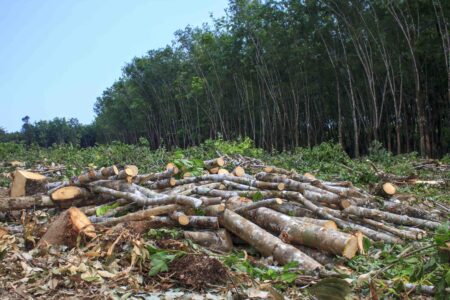Cocoa industry calls for systemic change to solve pricing crisis

Cocoa farming in Ghana and Ivory Coast remains a key industry (pic, ICAM)
The global cocoa and chocolate world has been rocked this week as prices have continued to surge to an alarming new high of $10,000 a tonne on the US stock exchange which will have major implications for the wider industry.
Unsurprisingly, the sector has been quick to vocalise its collective concern at this latest saga that has seemingly spiralled out of control, with prices having tripled in the past twelve months alone – this is patently clear to all that this is not a sustainable situation for anyone within the value chain, least of all the farmers in core producing nations of Ghana and Ivory Coast.
With farmgate contracts having been dispatched earlier this year at under $2,000 a tonne, farmers are receiving less than 20% of the value that cocoa is now changing hands on the US exchange, the huge gulf between those at the top end of the scale – the hedge fund investors who have pumped billions into the system, and the frontline agricultural workers earning less than $1 a day in some instances, could not be more apparent than it is today.
As one cocoa sector observer remarked on Linkedin earlier today: “We will never have a better chance to change things” in terms of focusing industry and government attention on the subject, given the sheer weight of global coverage that is now being placed on the topic of cocoa and its related confectionery industries.
While the wider industry has outlined the need for multiple solutions to myriad interlinked issues of underlying poverty, lack of investment in developing crop strains, controlling deforestation, introducing agroforestry and social support for often remote rural communities, there is an equally as significant need for systemic change in the way that cocoa is traded.
On these points, in my own observations over the past six or seven years, I’ve seen major corporations unveil significant sustainability programmes that aim to engage with as many as possible of the several million cocoa farmers in West Africa as is practical, which have all been well meaning and definitely gained some traction. But there is clearly still a significant way to go on this, especially given the fact that the pandemic, as well as global instability in wider supply chains has impacted on West Africa severely, and failed to so far stem the tide on the 1.5 million children exposed to child labour in the region, largely as farmers are unable to pay adult labourers due to the depths of poverty.
So, perhaps in terms of most pressing issues to resolve of all is simply the need to find a way, urgently, to elevate Ghana’s farmgate rates to a level that will genuinely help make a positive difference in pure financial terms to those toiling the hardest to deliver crops.
For many market observers, there simply has to be a means of achieving this – especially given the fact that it has been reported to Confectionery Production, that in many neighbouring countries to Ghana and Ivory Coast, the levels of farmer pay have considerably exceeded what is being achieved in those countries.
This has not gone unnoticed in West Africa, which has led to reports of agricultural strikes being considered, as well as calls this week within farming communities for the leader of Ivory Coast’s governing cocoa body to step down, unless the situation rapidly improves. We are clearly at crisis point within the industry, and these are fundamental problems that need clear and decisive action rather than words to resolve.
It is not by coincidence that the topic of farmer pay is the core defining subject matter for next month’s World Cocoa Conference, for which Confectionery Production is the exclusive media partner. So if you have not registered already, then please do engage with this major event – that will have the eyes of the industry upon it, as solutions will hopefully be brought forward that will actually help deliver true sustainability for the industry, which is urgently needed to ensure the sector’s long-term viability.
Neill Barston, editor, Confectionery Production
- Keep in touch at [email protected], or via social media @confectionprod or our LinkedIn pages



